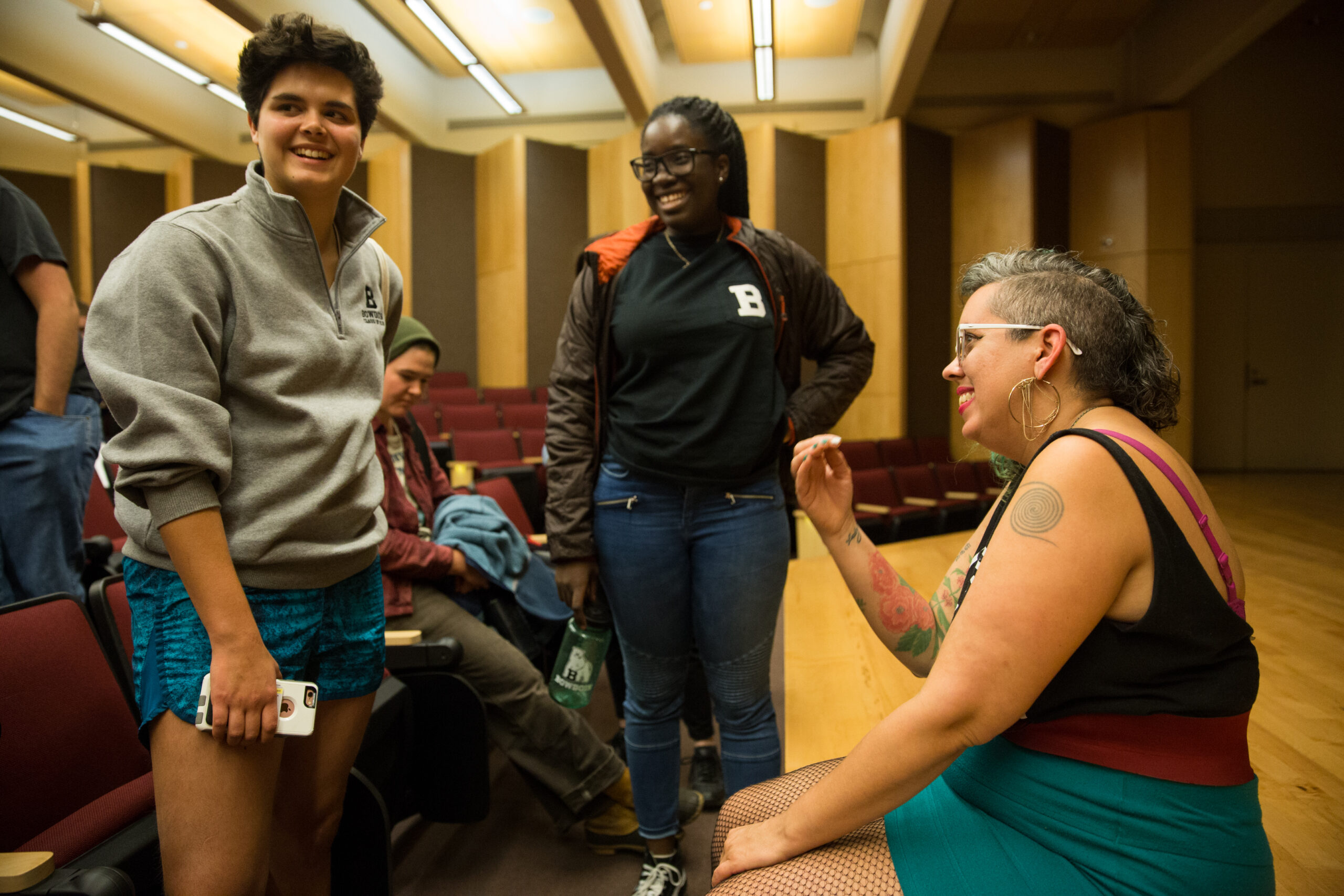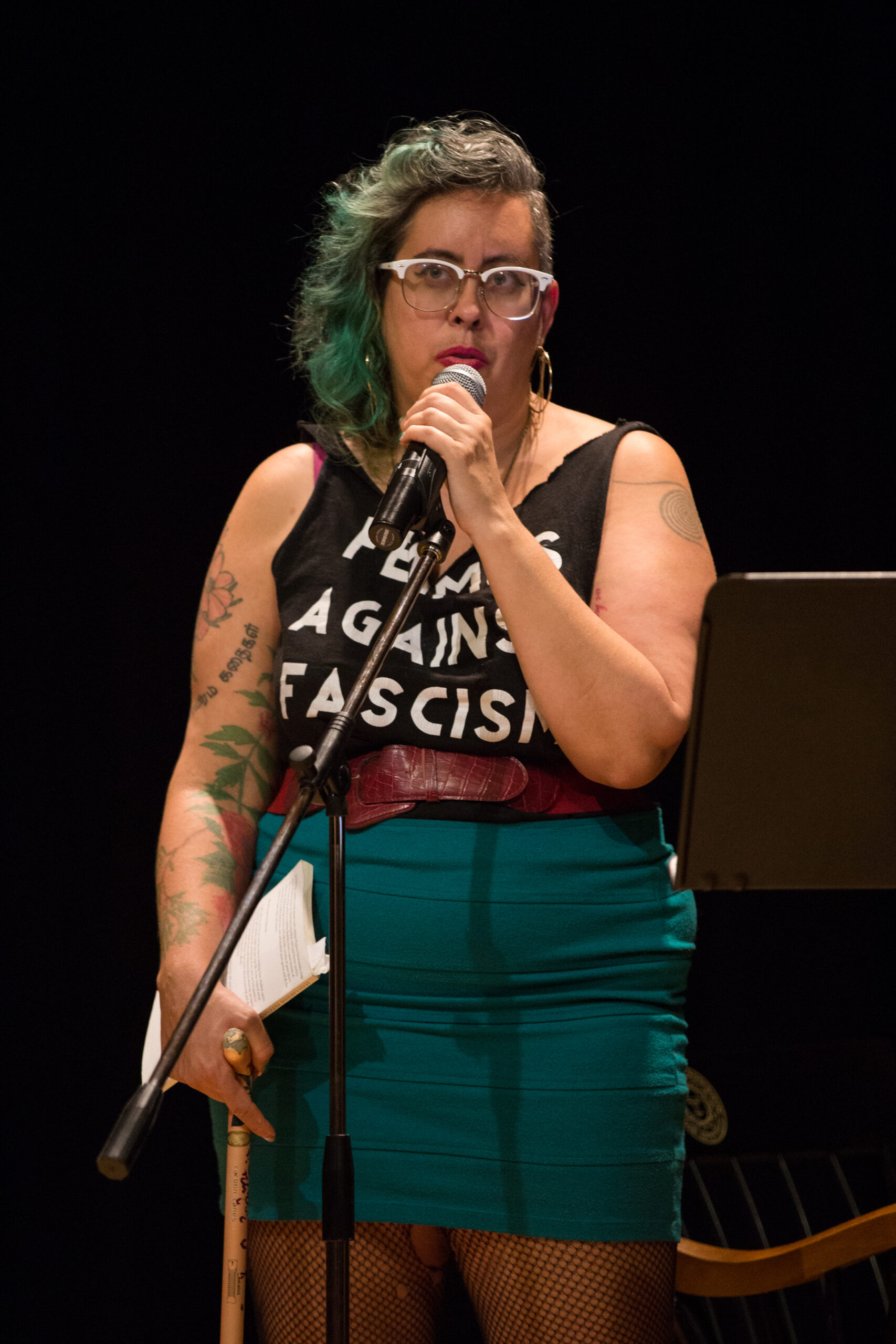Disability and identity: imagining a ‘liberated future’
October 13, 2017
 Ann Basu
Ann BasuA “queer disabled nonbinary femme writer and cultural worker of Burger/Tamil Sri Lankan and Irish/Roma ascent” is how Leah Lakshmi Piepzna-Samarasinha describes herself on her website. An activist and poet, she came to Bowdoin last night to share her work in several events sponsored by various groups from all areas of campus, underscoring the intersecting identities that have influenced her experience and perspective.
Piepzna-Samarasinha’s visit culminated in a performance titled “Queer Disabled Femme of Color Magic” that was co-sponsored by the Disabled Students Association (DASA), Center for Sexuality, Women and Gender (SWAG) and multiple other student organizations and administrative offices. She read from her 2016 Audre Lorde Poetry Award Finalist book of poems, “Bodymap.”
 Ann Basu
Ann BasuPiepzna-Samarasinha hopes to contribute to discussions about disability and access on college campuses. According to her, such discussions and the organization of students around disability justice, including on Bowdoin’s campus, have only recently become more frequent due to challenges of access and inclusion that students with disabilities face.
“I think that historically … disabled students are systematically excluded from being able to go to school or pressured to pass as normal and pretend that we’re not disabled. It makes it difficult for disabled students to organize and talk about our issues,” she said.
During her performance, Piepzna-Samarasinha articulated the need for visionaries at the present moment.
“It can feel really, really hard to imagine a liberated future, but this is actually the time when we have to imagine it the most,” she said. “It’s at these moments where it is on us to dream something that is beyond survival, that’s actually to us flourishing and living the lives that we’re meant to have. And that comes out of disabled bodies, of black and brown bodies and queer bodies. We’re the ones who always dream some completely crazy shit that was not supposed to happen.”
Piepzna-Samarasinha was born and raised in Worcester, Mass. and has since spent time in Toronto and Oakland, Calif. Drawing on her life experiences in her works—which includes several books and other pieces published in over a dozen publications and anthologies—she discusses the intersections of disability and racism and classism and gender, as well as topics of abuse and survivorhood.
In 2006 she co-founded Mangos With Chili, a performance group of queer and trans artists of color and was co-director of the group until 2015. Today Piepzna-Samarasinha often works with an organization called Sins Invalid, a collective of performance artists who identify as disabled, queer or as a people of color.
“[Sins Invalid co-founder Patty Berne] believes that it’s pretty radical for disabled people to suggest that we’re beautiful, that we’re sexual, that there’s nothing wrong with our bodies as they are,” she said in a phone interview with the Orient. “But we’ve kind of used that as a lens to look at the issues that we face as disabled black and brown folks and otherwise marginalized folks.”
Daisy Wislar ’18, co-chair of DASA, was a major coordinator of Piepzna-Samarasinha’s visit. Wislar hopes that Piepzna-Samarasinha will encourage a necessary discussion of disability and intersectionality on campus.
“The conversation about disability at Bowdoin is so new. I really wanted to broaden and complicate our discussion and make it more nuanced and more intersectional and more radical,” she said.
Piepzna-Samarasinha also attended the Queer Person of Color Lunch and Intersections Dinner, both organized by SWAG.
“[Her visit] is impactful and important to so many different communities on campus, so it’s a really cool way for a lot of different people to coordinate efforts,” said Wislar.
A student organizer of the events, who wished to remain anonymous, hopes that Piepzna-Samarasinha’s presence and message will be reassuring to queer students of color on campus.
“I hope that students of color here are able to see someone who represents them out in the real world because I think … public figures like [Piepzna-Samarasinha] are lacking in the real world,” the student said. “[Here is] someone who’s making it their life’s mission to educate people and to make people feel comfortable about their identities.”
Thursday afternoon, the artist also held a workshop and discussion at MacMillan House titled “No Body Left Behind.” In the workshop Piepzna-Samarasinha explained the concept of disability justice, a movement started by those marginalized by the mainstream disability rights movement, namely queer women of color, and introduced artists and organizers involved in the movement.
She discussed the challenges faced by these communities that prompted the movement, including stigma, denial and ableism. She also prompted discussion about the accessibility of social justice movements and events, with the goal of giving students—with and without disabilities—tools to organize activism that is accessible and inclusive of all people.
“Learning about things like access and how to care for each other and . . . how to fight for dignity and justice is really important for everybody because it’s going to affect all of us eventually,” said Piepzna-Samarasinha.
“Often the push to make movements accessible is coming from disabled people, but it needs to be coming from allies as well,” Wislar said. “It needs to be coming from people without disabilities who are saying, ‘This matters to me that this experience and this perspective is in the room.’”

Comments
Before submitting a comment, please review our comment policy. Some key points from the policy: